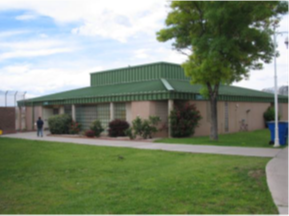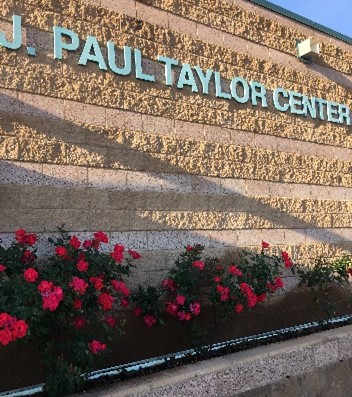Facilities
New Mexico has two Juvenile Corrections Facilities. Juveniles may serve a one-year (short-term) or a two-year (long-term) commitment. These facilities are for juveniles who have been adjudicated and sentenced.

Youth Development and Diagnostic Center (YDDC)
4000 Edith Blvd NE
Albuquerque, NM 87107
Phone: (505) 841-2400
Male and female clients are held in YDDC for a commitment period of up to one year, up to two years or up to age 21, and for parole revocation terms. YDDC is also the receiving facility for those clients for whom the court orders a diagnostic evaluation. YDDC also includes the Central Intake Unit where all juveniles committed to CYFD custody are assessed and evaluated for appropriate placement within the statewide juvenile system.
Behind the security fence, YDDC looks more like a college campus than a correctional facility. Its well-kept 13 acres of land include roses, grass, concrete walkways, cafeteria, medical facility, a basketball/pickleball court and an athletic field. The facility also includes a centralized gymnasium, weight room, vocational education and a diploma-granting Foothill High School. The educational building with a library, classrooms, vocational training areas and office spaces creates separation from housing and educational areas, providing a standalone facility similar to real-life educational configurations.
The location of this facility provides convenient access to services, families and other support networks, coupled with the normative environment of the campus-like setting and the behavioral and case management programs already in place.
- Capacity: 108 beds (7 units operational; 3 units currently closed)
- Clients: Males and females up to age 21
- Houses 15-day Diagnostic Unit
- Houses Central Intake

John Paul Taylor Center (JPTC)
10015 Robert Larson Blvd
Las Cruces, NM 88007
Phone: (575) 526-5900
John Paul Taylor (formerly the Juvenile Justice Rehabilitation Center) opened in 2002 and up until 2003 was privately operated by the Southwest Key Program. In 2003 CYFD took over the facility and converted the center from a contractor-operated facility to a state-operated facility.
In 2009, a cafeteria was added and in 2012, a greenhouse. Then, in 2013, construction was completed on a full-size, state-of-the-art gymnasium and educational building with classrooms and spaces to support programming and learning opportunities for Aztec Youth Academy. The JPTC vocational education building opened in 2016 and offers woodworking, welding, and automotive mechanics.
Like YDDC, the facility has some grass, concrete walkways, medical facility, a basketball/pickleball court and will receive a new athletic field in FY24.
- Capacity: 48 beds
- Clients: Males up to age 21

Facility Services
Behavioral Health and Diagnostic Services
Our Diagnostics provides comprehensive Diagnostic/Psychological Evaluations that inform treatment, as well as comprehensive Pre-dispositional Evaluations which inform the Courts regarding treatment options and recommendations for adjudicated youth prior to Dispositional Hearings.
Facilities Behavioral Health provides individual therapy, group therapy, family therapy, Substance Abuse Counseling, Sex Specific therapies for youth who have caused sexual harm, couples/co-parenting counseling, social skills training, Restorative Justice Services, and Specialized Behavioral Management Services. They also provide 24/7 on-call for emergencies.
Medical Services
The JJS Medical Department consists of a system of care that provides health, dental and vision services to our clients. Additional services include intake screening and assessment, sick calls and clinic visits, ancillary care, psychiatric care, pharmacy and medications, specialty or chronic care and discharge planning/training. These services ensure that the health care provided coordinates the emotional, physical, and psychiatric health care of the clients in such a way that is consistent with national JJS standards. They also provide 24/7 on-call for emergencies.
Education Services
New Mexico CYFD/Juvenile Justice Division oversees two state supported high schools that are funded as a part of the CYFD annual legislative appropriation. Foothill High School is located at YDDC and Aztec Youth Academy is located at JPTC. JJS State Supported High Schools are accredited by the NM Public Education Department and function under the NMPED Standards for Excellence framework.
Our schools provide technical/vocational programming for high school and post high school students. Students are also offered dual enrollment classes and after graduation, can pursue post-secondary education through Central New Mexico Community College or Dona Ana Community College.
Physical Plant
Physical Plant supports 25 buildings located at YDDC, JPTC, the Camino Nuevo Youth Center, Albuquerque Boys Reintegration Center and one office building. In addition to ground maintenance, preventative maintenance, new construction, and repairs/remodels, of these buildings, our Physical Plant Department is responsible for vehicles, the camera system, facility radios, phones, and IT connections. Physical Plant assigns & completes work orders generated from staff. They request capital outlay funds for facility construction projects, manage budgets for these projects, and liaisons with contractors, architects and the General Services Department and suppliers to complete the projects. Commissary supplies clients with all necessary living items: clothes, shoes, personal hygiene products, etc. Commissary also employs (2) full-time custodians who clean & maintain the interior of the buildings. Physical Plant maintains a 24/7 on-call for emergencies.
Fire Safety and Security
Conducts fire, safety and sanitation inspections/drills and writes reports on inspections and provides recommendations for corrective action and compliance with Occupational Safety and Health Administration (OSHA), National Fire Protection Association (NFPA) standards. Conducts new employee training in Personal Protective Equipment (PPE), Blood Borne Pathogens (BBP), safety and sanitation procedures. Coordinates with personnel on Workman Compensation issues, notice of accident, loss and control. Assists in the development of emergency response plans.
Volunteer Services
Focuses on all aspects of planning, development, training, implementation, and evaluation of the volunteer program which connects clients to community resources & social service programs. These community resources & social service programs will aid in healing, family preservation and in the client’s reintegration into society.
Juvenile Public Safety Advisory Board (JPSAB)
The JPSAB consists of up to seven members appointed by the Governor. The Board’s purpose is to advise CYFD on release decisions for juvenile offenders committed to the custody of CYFD. The Board also provides recommendations regarding the care and treatment of youth assigned to facilities and any other matters pertinent in the judgment of the Board.
Prison Rape Elimination Act
PREA is a federal law established to address the elimination and prevention of sexual violence and sexual misconduct in correctional and juvenile systems.
